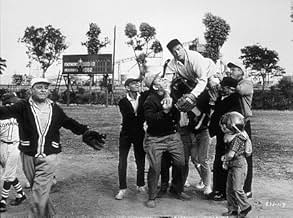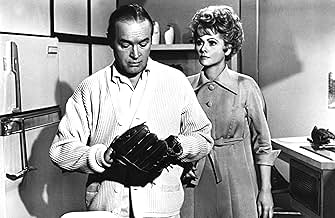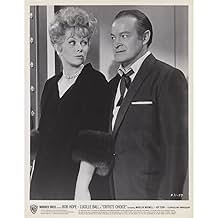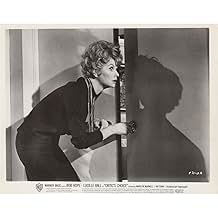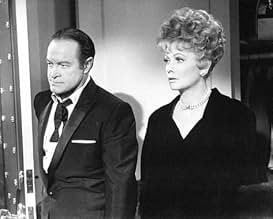Adicionar um enredo no seu idiomaParker Ballantine is a New York theater critic and his wife writes a play that may or may not be very good. Now Parker must either get out of reviewing the play or cause the breakup of his m... Ler tudoParker Ballantine is a New York theater critic and his wife writes a play that may or may not be very good. Now Parker must either get out of reviewing the play or cause the breakup of his marriage.Parker Ballantine is a New York theater critic and his wife writes a play that may or may not be very good. Now Parker must either get out of reviewing the play or cause the breakup of his marriage.
- Direção
- Roteiristas
- Artistas
- John Ballantine
- (as Ricky Kelman)
- Philip 'Phil' Yardley
- (as Evan McCord)
- Direção
- Roteiristas
- Elenco e equipe completos
- Produção, bilheteria e muito mais no IMDbPro
Avaliações em destaque
Stepping into the roles played on stage by Henry Fonda and Georgeann Johnson are Bob Hope and Lucille Ball in their fourth and last film together. The more traditional Hope and traditional Lucy are to be found in their earlier films Sorrowful Jones and Fancy Pants. Still Critic's Choice works a whole lot better for them than The Facts of Life.
Bob Hope is a theater critic and he's got a son by his first marriage to Marilyn Maxwell, Ricky Kelman. He's married now to Lucille Ball and Lucy's taken it in her head to write a play about her family life growing up with two sisters, Marie Windsor and Joan Shawlee, and her mother Jessie Royce-Landis. Hope fluffs the idea off, but this only makes Lucy more determined especially when she's working with director Rip Torn and producer John Dehner.
There are a ton of characters not in the original play which took place in the Hope/Ball apartment. The addition of a lot of these people allowed Hope and Lucy to engage in some of their traditional comedy which they didn't do in The Facts of Life and paid dearly for it.
This has to be the only film I know where the 'other' woman is the first wife. Marilyn Maxwell who it was reputed Hope was involved with around 1950 and who appeared in The Lemon Drop Kid with him, sees her chance back with him as Rip Torn starts to get interested in Lucy.
Bob and Lucy get good support from a well chosen cast of familiar faces and Critic's Choice should please their fans.
A major problem is the casting. The lovable Bob Hope as a mean-spirited, psychologically abusive husband? Lucille Ball as a mousy, milquetoast-ish wife who mostly takes the abuse her pathetic husband dishes out? The real life Lucille Ball would have kicked Bob Hope's character to the curb after the first 30 seconds -- and we all would have cheered!
But another major problem is that everyone seems to be sleepwalking through their parts. You would expect Jim Backus and Rip Torn to breathe a little life into their characters, but quite untypically, they seem to be phoning in their lines and waiting for their paychecks. Although I am quite impressed with Rip Torn's ability to do handstands in his younger days.
If you are a fan of any of these stars, they ALL have done better films. I'd suggest checking those out first.
On the other hand, there's little doubt about Bob Hope's aspirations. From his earliest days in vaudeville, Hope was a comedian, and he would always be a comedian. For all his kidding aside about earning as Oscar, Bob knew that he had little chance because Oscar very rarely went to a comedian. He even made his overt desire for an Oscar a part of his long- running comedy routines, and it was sure to get a laugh decade after decade
That doesn't mean that Bob Hope didn't do some very funny movies. But his type of humor wasn't the subtle, clever or zany type that usually involved great or very good acting. Clark Gable, James Stewart, Carole Lombard and Claudette Colbert were some of the very accomplished dramatic actors who could do Oscar-winning caliber comedy in movies. Bob's comedy forte was the one-liner. Or, make that, a string of one- liners, one after the other. And in that, he often aroused some great laughter.
So, that brings us to this movie, "Critic's Choice." This film is meant to be a semi-serious movie about Broadway and a critic's life, with a comedic outlook. And Lucy plays a serious character, a "straight man" to Bob's wisecracks and one-liners. I think it was intended as a light comedy to begin with, sans any zaniness on Lucy's part. The very funny parts are in the last half with Bob. He has some zany scenes himself, and a few strings of one-liners that bring out loud laughter. Some examples are: "This is the drunkenest room I've ever been in." "This apartment's all uphill." And, "I'd just like to be there when we get where I'm going."
"Critic's Choice" is a nice film for an evening of light entertainment, and worth watching just to see two of the great comics of all time together.
Você sabia?
- CuriosidadesLast of four feature films that Bob Hope and Lucille Ball made together. The other three pictures were Um Conde em Sinuca (1950), A Menina dos Meus Olhos (1949), and O Jogo Proibido do Amor (1960).
- Erros de gravaçãoThe movie takes place in New York, but during the softball game, the famed Los Angeles Gas Works tank is clearly visible in the background.
- Citações
John Ballantine: For the record, Sisters Three was written by Angela Ballantine, directed by Dion Kapakos, and produced by mistake.
- Cenas durante ou pós-créditosEnding: "The absolute End"
- ConexõesReferenced in What's My Line?: Bob Hope and Lucille Ball (1963)
Principais escolhas
- How long is Critic's Choice?Fornecido pela Alexa
Detalhes
- Data de lançamento
- País de origem
- Idioma
- Também conhecido como
- Cuando el corazón manda
- Locações de filme
- William Mead Homes, 1300 Cardinal Street, Los Angeles, Califórnia, EUA(Apartments/baseball field)
- Empresa de produção
- Consulte mais créditos da empresa na IMDbPro
- Tempo de duração1 hora 40 minutos
- Proporção
- 2.35 : 1
Contribua para esta página



